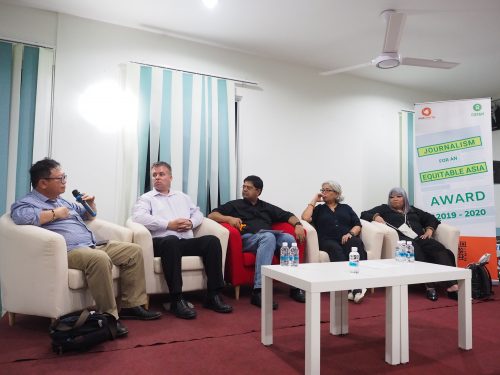A rare public articulation of Russia’s grand strategy in the Asia-Pacific was expounded at Asia Centre by H.E. Kirill Barsky, Ambassador of the Russian Federation to the Kingdom of Thailand on 30 March 2017. Entitled “Russian Grand Strategy in the Asia Pacific: What Role for ASEAN?”, Asia Centre convened the roundtable to discuss Russia’s dramatic resurgence in international politics and explore its foreign policy goals in the region.
Asia Centre’s moderator, Ms. Alexandria Demetrianova posed a key question to kick start the roundtable – Does Russia, a great power of the past few centuries, have a clear strategy for the Asia-Pacific region and for ASEAN in particular?
Ambassad or Barsky’s keynote presentation on the pillars of Russian foreign policy and its respect for international law and the principles of the UN Charter set the context. He went on to expound that Russia sought better economic and trade relations with ASEAN in order to cater to its domestic economic transformation. Ambassador Barsky noted that Russia’s ties with Southeast Asia preceded the formation ASEAN, as Cold War Russia supported various national movements in the region and provided security assurances at that time. Post-Cold War, he pointed out Russia has been engaged in a dialogue relationship with ASEAN over the past 20 years and seeks to expand its connectivity with the region.
or Barsky’s keynote presentation on the pillars of Russian foreign policy and its respect for international law and the principles of the UN Charter set the context. He went on to expound that Russia sought better economic and trade relations with ASEAN in order to cater to its domestic economic transformation. Ambassador Barsky noted that Russia’s ties with Southeast Asia preceded the formation ASEAN, as Cold War Russia supported various national movements in the region and provided security assurances at that time. Post-Cold War, he pointed out Russia has been engaged in a dialogue relationship with ASEAN over the past 20 years and seeks to expand its connectivity with the region.
Dr Peter Shearman, an expert on Russian foreign policy from the Institute of International and Security Studies at Chulalongkorn University spoke on Russia’s role in light of an emerging multipolar structure and as a possible balancer between China and the USA. Dr Pavel Slutsky, Associate Professor at Chulalongkorn University, characterised the Russia-ASEAN relationship as unpredictable, lacking a clear strategy and largely shaped by external forces. Dr Takashi Tsukamoto, Associate Dean (International Affairs) Faculty of Political Science, Thammasat University provided insights into Russia’s role in shaping Japanese foreign policy on ASEAN.

Collectively, the panel of experts raised a number of salient points, namely:
- the current ‘soft’ geopolitical footprint of Russia on Southeast Asia as countries continued to look to the American security umbrella;
- the modest economic engagement with the region – principally on military, energy (nuclear) and fossil fuels;
- a lack of clear strategy towards the region and a confusing articulation of the place that ASEAN occupies in Russian foreign policy; and
- the emerging diplomatic friendship between Japan and Russia that has emerged in light of structural realities: competition between China and the USA.
 The roundtable attracted an audience of 40 participants including representatives from the diplomatic corps. An active question and answer between the audience and speakers followed the presentation. It was an event that lasted well over two hours and Asia Centre was pleased to convene this public articulation of Russia’s long term goals in the region.
The roundtable attracted an audience of 40 participants including representatives from the diplomatic corps. An active question and answer between the audience and speakers followed the presentation. It was an event that lasted well over two hours and Asia Centre was pleased to convene this public articulation of Russia’s long term goals in the region.


